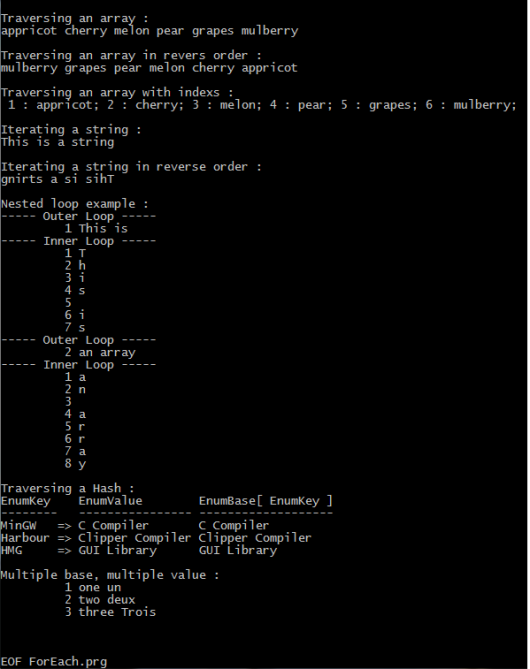/*
ForEach.prg
In addition clasical FOR..NEXT loop, Harbour offers another FOR loop :
FOR EACH..NEXT.
Simplest syntax of this loop is :
FOR EACH <xValue> IN <xList>
...
NEXT
For arrays, this structure is equivalent to :
FOR <nIndex> := 1 TO LEN( <aArray> )
<xValue> := <aArray>[ nIndex ]
...
NEXT
Relations and rules for <xValue> and <xList> in FOR EACH loop :
If <xList> is ... <xValue> is ...
----------------- ----------------
<array> an element of <array>
<string> a single character in the <string>
<hash> <xValue> of <xKey> => <xValue> pair in the <hash>
Strings can be processed by indexing like arrays.
For string iteration, lib is xHB, so you need add
xHB lib calling in the your compile command:
hbmk2 -lxHB ForEach
and add your source prg file :
#include "xhb.ch"
*/
#include "xhb.ch"
PROCEDURE Main()
CLS
aFruits := { "appricot", "cherry", "melon", "pear", "grapes", "mulberry" }
c1Fruit := '' // Variable for iteration value must be exist
// before FOR ... statement
?
? "Traversing an array :"
?
FOR EACH c1Fruit IN aFruits
?? c1Fruit, ''
NEXT
/* Note that this loop is equivalent to :
?
FOR n1Fruit := 1 TO LEN( aFruits )
c1Fruit := aFruits[ n1Fruit ]
?? c1Fruit, ''
NEXT */
/* For a list in reverse order with classical FOR
?
FOR n1Fruit := LEN( aFruits ) TO 1 STEP -1
c1Fruit := aFruits[ n1Fruit ]
?? c1Fruit, ''
NEXT */
/* ... and with FOR EACH*/
?
? "Traversing an array in revers order :"
?
FOR EACH c1Fruit IN aFruits DESCEND
?? c1Fruit, ''
NEXT
/* Sometime we needs something like this :
?
FOR n1Fruit := 1 TO LEN( aFruits )
c1Fruit := aFruits[ n1Fruit ]
?? STR( n1Fruit, 2 ), ":", c1Fruit + ';'
NEXT */
/* FOR EACH loop allow us using some 'internal' functions;
but a 'special' way : */
?
? "Traversing an array with indexs :"
?
FOR EACH c1Fruit IN aFruits
?? STR( c1Fruit:__ENUMINDEX(), 2 ), ":", c1Fruit + ';'
NEXT
cString := "This is a string"
/* ... and a string example :
?
? "Iterating a string by FOR .. NEXT :"
?
FOR nIndex := 1 TO LEN( cString )
?? cString[ nIndex ]
NEXT */
c1Char := ''
?
? "Iterating a string :"
?
FOR EACH c1Char IN cString
?? c1Char
NEXT
?
? "Iterating a string in reverse order :"
?
FOR EACH c1Char IN cString DESCEND
?? c1Char
NEXT
?
? "Nested loop example :"
aArray := { "This is", "an array" }
c1String := ''
FOR EACH c1String IN aArray
? "----- Outer Loop -----"
? c1String:__ENUMINDEX(), c1String
? "----- Inner Loop -----"
FOR EACH c1Char IN c1String
? c1Char:__ENUMINDEX(), c1Char
NEXT
NEXT
?
? "Traversing a Hash : "
? "EnumKey EnumValue EnumBase[ EnumKey ]"
? "-------- ---------------- -------------------"
hSoftWare := { => }
HB_HKeepOrder( hSoftWare, .T. )
hSoftWare['MinGW ' ] := 'C Compiler '
hSoftWare['Harbour' ] := 'Clipper Compiler'
hSoftWare['HMG ' ] := 'GUI Library '
hProgram := NIL // { => }
FOR EACH hProgram IN hSoftWare
? hProgram:__ENUMKEY(), "=>", hProgram:__ENUMVALUE(),;
hProgram:__ENUMBASE()[hProgram:__ENUMKEY()] // Alternate syntax
NEXT
?
? "Multiple base, multiple value : "
aArrayNr := { 1, 2, 3 }
aArrayEn := { "one", "two", "three" }
aArrayFr := { "un", "deux", "Trois" }
cNumNr := 0
cNumEn := ''
cNumFr := ''
FOR EACH cNumNr, cNumEn, cNumFr IN aArrayNr, aArrayEn, aArrayFr
? cNumNr, cNumEn, cNumFr
NEXT
@ MAXROW(), 0
WAIT "EOF ForEach.prg"
RETURN // ForEach.Prg.Main()

Tag Archives: iteration
Algorithm Terms
Algorithm :
A set of rules and/or a finite series of steps that will accomplish a particular task.
See also : Iteration, Selection, Sequence
Iteration :
One of the three basic building blocks of algorithm development (the others are sequence and selection). Iteration refers to operations that are performed repeatedly, usually until some condition is satisfied.
See Also: Selection, Sequence
Selection :
One of the three basic building blocks of algorithm development (the others are sequence and iteration). Selection allows control to flow along a number of possible paths, depending on the circumstance encountered.
See Also: Iteration, Join, Projection, Sequence
Sequence :
One of the three basic building blocks of algorithm development (the others are selection and iteration). A sequence is a series of discrete steps that must be performed in a particular order.
See Also: Iteration, Join, Projection, Selection